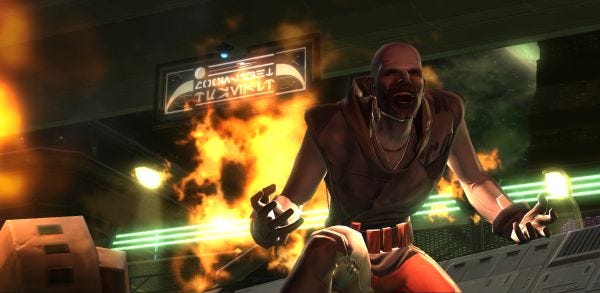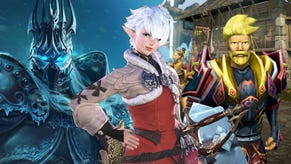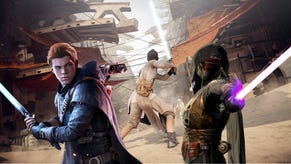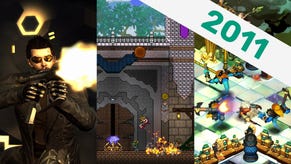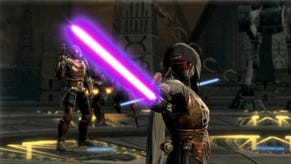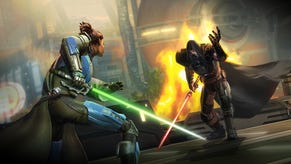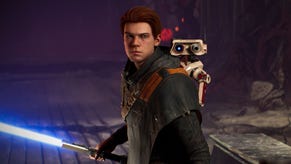Interview: BioWare's James Ohlen On SWTOR
They were making this game a long time ago.
James Ohlen is a senior creative director at BioWare, and has spent the last six years working on Star Wars: The Old Republic. We spoke to him to find out how he thinks the launch has gone, how the game is being received, and what we can expect to see in the first update, due next week.
RPS: How do you think the launch has gone?
James Ohlen: Really, really well. The servers have stood up, we've got a population spread across the entire game. The targets in terms of how fast players are running through the content, they're hitting it at about the rate we want. Obviously we had a small percentage of players at the very beginning who were able to race through the content in record time, but we knew that going in, because those were the guys from the beta who had planned out a path from beginning to end, so they could be the first. In terms of subscribers, it keeps on growing every day. We've got very positive word of mouth. I'm confident in saying it's going to be BioWare's biggest game yet, in terms of how successful it's going to be.
RPS: Have you personally worked on an MMO before?
Ohlen: Uh, no. This is my first. I can call myself experienced enough because I've been working on it for six years! It's been quite the experience. Some of the designers that I hired during the course of the game do have experience on MMOs before. Guys who worked on Warhammer, and some guys like Damien Schubert who worked all the way back to Meridian 59.
RPS: It must be a weird experience, it's such a different space than you usually work in.
Ohlen: Oh yeah. I think one of the strangest things is that the game never ends. It didn't get less busy when we launched. I'm used to working on PC games, like the Baldur's Gate series, Neverwinter Nights, or console games like Knights of the Old Republic or Dragon Age, where once the game is done, it's done. You're able to go on holiday, read the reviews, and not worry about the game any more. But with SWTOR, we're busy working on all of the new game content we're going to release over the course of this year. We have a game update coming in one week, and then we have another in March, and then more updates coming after that, as fast as we can pump them out. It's really important to prove to our fans that we're serious about supporting the game, that we continue to produce content on a regular basis, to show that we're going to support the Star Wars universe. We have a team that's quite big, bigger than the team that worked on the Mass Effect or Dragon Age franchise, and that team is entirely focused on continuing to produce new content. It's a never ending battle!
RPS: Are there any regrets of having released the week before Christmas?
Ohlen: Well, it would have been preferable to release earlier than that, but the fact was we weren't ready. EA was good about allowing us to push back the date until we were ready. It was obviously a lot of work to get it out before Christmas, but we managed to pull it off, and I'm happy that we were able to push back the date because it allowed us to have a much smoother launch than online games are known for.
RPS: Did anyone manage to get a holiday?
Ohlen: Some people did, yes. Most the team stayed within Austin and were available by phone. Obviously the people supporting the servers had to be working over Christmas, and some key individuals were too. We had the people who are working on the first game update, who are a bunch of heroes, who had to continue working over Christmas to make sure it was ready. We made sure people had a break, as it's going to be a long slog.
RPS: You mentioned the smooth launch. I think, server queues aside, it's been recognised as the smoothest MMO launch they've seen. What did you guys do to prepare for that?
Ohlen: Actually, we server queues, we knew we were going to have them, and we expected them at different points, because you don't want to be in the situation where the population is spread across too many servers, because then they'll feel empty. You have to have a critical mass of players on each server, which means that there's going to be queues. But with the smooth launch, I think the main thing there was, it was in BioWare's and EA's best interest that if we're going to be taken seriously, we had to come across as a AAA massive multiplayer. And the fact is, there really has been only one other AAA MMO in the last decade or so, and that was World Of Warcraft. I guess Rift was also a pretty good launch this year as well. You saw Rift do well because it had such a good launch. So it's a lesson learned. If you have a good launch, players are going to trust you, and not screw up the world, and if you don't do that you're probably not going to succeed.
RPS: I've played the game a few times over the last couple of years, and I've noticed a progression in that time toward being more WoW like, to be more of a traditional MMO than it started. Can you talk about any compromises you had to make in order for it to work?
Ohlen: Our combat system has always been the same since we first developed it in 2007. We've just been adding levels to it. We've been adding more game systems that are specific to the MMO genre, but I don't really feel we've made any compromises. It's been a conscious choice - I don't know why there's this perception, but maybe it's because in the MMO space there's only ever been one big hit. But if you look at other genres, like the FPS, the RTS games, action, sports... Taking the FPS as an example, they've use the same interface, the same mechanics, for twenty years. You don't throw that stuff away. When you have a new Call Of Duty, or Gears Of War, it's going to take the interface, mechanics and controls, and refine and add to them. They're not going to throw them out, but continue to refine them. That was our strategy. We wanted to make sure we took all the lessons learned from previous MMOs, and add our own innovations to it. In fact, if you look at SWTOR in terms of how many innovations and changes it adds to the genre, it's quite significant when compared to other genres out there.
RPS: One of those additions is obviously story. I don't know if you'd agree, but I'd say that's BioWare's speciality. Can you remember any times when you struggled or had breakthroughs with how to fit a more narrative-led adventure into an MMO?
Ohlen: One of the initial things we had to get over - this is something that a lot of fans and critics said - was that you can't do personal stories in an online game. Because everyone has the same personal story, and how is that going to work? And we were like, as long as people are having a personal story, it's personal to them, and they're not going to mind that other players have a similar experience. We got over that hump and decided it wasn't going to be a big issue, and it turned out not to be. That was very early on, back in 2006, because if we wanted to do a BioWare-style personal story, with companion characters that refer to your actions and change according to your choices, it was something we'd have to do. There were people who doubted it, even within BioWare, there were people who didn't think it would fit. But it's been very well received. And it wasn't surprising to me, because when you look at the "MMORPG" genre, you have the letters "RPG" in there, and roleplaying games have always had story in them. I've always thought it was something that was missing, and if you put it in there, people would really gravitate toward it. You can't have an RPG without story elements. Even an open world game like Skyrim has a lot of story. Even Diablo III, from what I've seen, they're adding more story elements to that game as well.
RPS: Why do you think that is? Why do you think as these things progress, people crave more story?
Ohlen: I think it's because story is timeless - people love to live through story. So many different entertainment mediums revolve around story - books, movies, plays, musicals, television. All these different entertainment forms are focused around story, so I think having more story come to videogames is a natural progression. I think maybe there's two styles of videogames. There are videogames that are very much entirely focused on gameplay mechanics - and are just essentially games. But then most AAA big games have that story element to them. So for all the big games in the future, you're going to see stories.
RPS: The other big change that's immediately obvious are the companions. How have they been received?
Ohlen: Yes. People have reacted very well to them. It's funny, we do market research on our games even after launch, on what players like, what they're not enjoying. The top three things that people constantly list as the things they enjoy the most about SWTOR are the things that BioWare is famous for. So story, choice, and companions are always the top three. We knew the companion characters were a little bit risky, because MMO players often don't like to have pets. And with SWTOR we were giving everyone a much more advanced, personable character, who also act like pets. So there was a risk there, but there's no backlash there. Entirely the opposite, people love it.
RPS: I think something we were surprised not to see in the game was an idea Warhammer brought, in the social quests. Do you have any plans to bring something like that in?
Ohlen: I can say that is definitely something we're looking at, and when we talk more about our event system, we may talk more about things like that.
RPS: During development the game was often described as KOTOR 3 - 10. Does that mean that BioWare has no plans to do another single player game in this universe? Are all the efforts focused on the MMO?
Ohlen: Right now for Star Wars all the effort is focused on SWTOR. We want to support the game in a major way, so we don't have any other projects in the Austin studio - we're entirely focused on supporting SWTOR for the foreseeable future. To tell you the truth though, I've been working on this project for six years, so at some point I'm going to want to move on!
RPS: So what can we expect to see in next week's update?
Ohlen: With our first update we have a flashpoint, Rise of the Rakghouls, which is in the vein of the story-heavy flashpoints that you've seen in SWTOR. We also are expanding Karagga's Palace, the second operation you can play through. It only had one boss on release. It's going to have five bosses. Karagga's Palace is very much based off of Jabba The Hutt's, there's a rancour in it, and over very cool things. We also have a lot of bug fixes and modifications. One thing we're very conscious about is we need to get rid of anything detracting from player experiences. It's a massive game, so we're going to have problems, and we're getting them fixed.
We then have a second update coming in March, and that's going to be a much bigger update, another flashpoint - part two of Rise of the Rakghouls - and we're going to have a whole new planet, with a brand new operation and warzone. We're going to have the second part of the Legacy system, which is the real meat of it. We're going to have guild banks, PVP ranking systems, and a lot of smaller additions and bug fixes. And we're already working on the third update. The story's already written out and being recorded for the fourth, fifth... and I can't say how many updates we have, but we have a lot. Just to give you an idea of how far we're planning ahead, we've already got voiceover being recorded for content you won't see for a year or more. We're really making sure we deliver new content. We also want to make sure that the Star Wars galaxy feels alive, so we're working on an event system, which we'll be giving more details about in the new future.
RPS: Thanks for your time.
